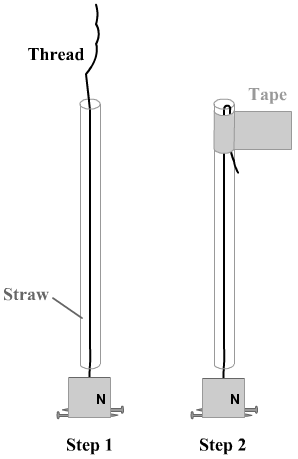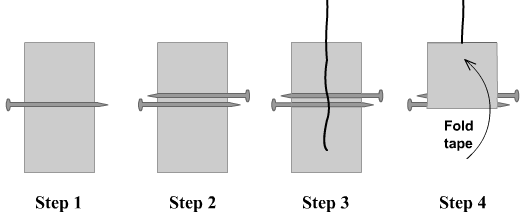
The Magnetometer
| Summary: |
Students will build an instrument capable of detecting a magnetic field and magnetic polarity. | Materials:
|
| Source: |
Adapted from a TOPS Terra Bagga activity. | |
| Grade level: |
K-12 | |
| Time: |
25 minutes | |
|
Student Learning Outcomes:
|
|
|
| Lesson format: |
Hands-on activity | |
| Standards Addressed: |
Click here to see a more detailed explanation of the relationship between this magnetometer activity and the National Science Education Standards. |
DIRECTIONS:
- Place a small piece (about 4 cm [1.5 inches] long) of masking tape on your desk with the sticky side up.
- Lay one pin across the tape (see Step 1 in Figure 1).
Figure 1 |
- Lay the second pin right next to the first, but with the point in the opposite direction (Figure 1, Step 2). The idea is to have the heads of the pins protrude a bit on each side to make it harder to stab oneself with the points.
-
Lay one end of the thread across the pins and tape, running perpendicular to the pins (Figure 1, Step 3).
Figure 2
- Fold the tape over the pins and end of the thread, with the crease in the tape at the pins (Figure 1, Step 4).
- Push the thread through the straw. Hold the straw upright (its length should be vertical) with the taped pins dangling just below the bottom of the straw. The top of the tape holding the pins should be just below (about 2-3 mm or 1/4 inch) the bottom of the straw without touching it. The taped pins should be able to spin freely on the thread (see Step 1 in Figure 2).
- Fold the top of the thread over onto the outside of the top of the straw, then tape it into place there (Figure 2 Step 2). Leave a little tab of tape sticking out - this can be used for students to write their names or group names on.
- Stroke the pins (lengthwise along the pins) from left to right several times with one pole of a permanent magnet. This will magnetize the pins.
- Hold the straw upright with the pins dangling beneath. Move the north pole of the magnet near the pins. One end of the pins will point towards the north end of the magnet (just like a compass does). This is the north-seeking end of your magnetometer. Label this north-seeking end by writing a small "N" on north-seeking end of the tape holding the pins.
BACKGROUND INFORMATION:
Magnetic fields are invisible; we can only see the effects of the magnetic force. Magnetometers are devices used to detect and measure the strength of magnetic fields. Compasses are basically magnetometers with directions marked on them. A magnetometer will dip or point toward a source of magnetism. Have students use their magnetometer to find things in your room or at home that are magnetic.
RELATED SECTIONS OF THE WINDOWS TO THE UNIVERSE WEBSITE:
Related activities:
References & Background Information:
- The force of magnetism
- Magnetic field
- Magnetic material
- Magnetism overview
- The Earth's magnetic field
- Detecting Planetary Magnetism
- Planetary magnetism







